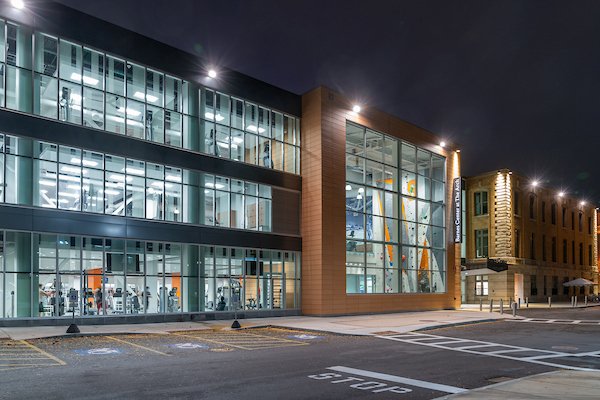Sexual Assault Awareness Month

by Leslie Skeffington, Assistant Director for Sexual and Relationship Violence Prevention, The Barnes Center at The Arch
In 2001, April was officially recognized as Sexual Assault Awareness Month (SAAM) in the U.S, but its roots can be traced back to the broader anti-violence and women’s rights movements of the 1970s. In 2000, The National Sexual Violence Resource Center (NSVRC) was founded and began organizing efforts to expand awareness initiatives. Since then, SAAM has grown into a nationwide effort to educate communities, promote prevention strategies and support survivors. Each year, the NSVRC announces a theme to focus on specific aspects of sexual violence prevention, such as consent, bystander intervention and policy change.
The history behind Sexual Assault Awareness Month has been to highlight the prevalence of sexual violence and break the cycle of silence and stigma that survivors often experience, in addition to hoping our awareness efforts encourage a dialog about prevention. In recent years, the movement has expanded to include creating inclusive spaces across campus that build community, support and empowerment for those affected. That is something we’ve really focused more on here at Syracuse.
Additional campus events during the month of April
Here is a list of programs being offered this April in honor of Sexual Assault Awareness Month. Students, staff and faculty are always welcome to request programming throughout the year through submitting a request to the Barnes Center:
- Mix It Up: Healthy Relationships on April 4, 2025 from 5:00pm - 7:00pm in the International Student Dept.
- Chalk The Walk - Survivors on April 7, 2025 from 10:30am - 12:30pm on the Quad
- Take Back The Night on April 10, 2025 from 6:30pm - 9:00pm in the Panasci Lounge Schine Student Center
- Empowerment Through Pleasure on April 14, 2025 from 5:30pm-7:30pm in the Lobby of the Intercultural Collective
- Expressions in Clay on April 15, 2025 from 6:00pm - 7:30pm in Barnes 309
- Feminist Self-Defense on April 17, 2025 from 6:30pm - 8:30pm in the Flannigan Gym Room 006/008
Resources for campus community members to reach out to if they are experiencing / know of someone experiencing sexual assault:
Barnes Center at The Arch Sexual and Relationship Violence Response Team is available 24 hours a day, 365 days a year, by calling 315.443.8000 and selecting option 1, and provides free privileged and confidential support to students who have concerns related to any form of sexual misconduct, including sexual assault, relationship violence, sexual harassment, stalking and cyberbullying.
Five books you can explore in the Libraries’ collection related to Sexual Assault Awareness Month:
1. Sexual Citizens: Sex, Power, and Assault on Campus by Jennifer S. Hirsch and Shamus Khan
This book isn’t exaggerating in its claim to be a landmark study. It provides a comprehensive look at how campus culture, power dynamics, social norms and even how campus architecture can contribute to sexual violence. It’s essential reading for understanding systemic issues and rethinking how prevention efforts can be more effective.
2. Unbound: My Story of Liberation and the Birth of the MeToo Movement by Tarana Burke
A lot of people know about the #MeToo movement as a social media campaign in 2017 but are unaware of its true origins within the Black community. Tarana Burke, a Black activist and organizer, founded the movement long before it went viral, centering the experiences of Black women. Her memoir sheds light on the deeper history and purpose of the movement that started within Black feminist traditions of healing and collective action. Her story is a powerful reminder that survivor advocacy is about much more than hashtags—it’s about long-term, systemic change and the power of community.
3. Saving Five: A Memoir of Hope by Amanda Nguyen
If you’re a college student looking to better understand how activism can create real change, Saving Five: A Memoir of Hope by Amanda Nguyen is must-read. Nguyen’s journey from survivor to policy advocate led to the passage of the Sexual Assault Survivors’ Bill of Rights in 2016, proving that individual voices can shape national policy. Her memoir offers both a personal and cultural perspective on the fight for justice, making it especially relevant for students passionate about social change, survivor advocacy and legal reform. This book is an inspiring reminder that young people have the power to challenge injustice and make a lasting impact.
4. Thinking Like an Abolitionist to Address Sexual Violence in Higher Education by Chris Linder, Nadeeka Karunaratne, and Niah S. Grimes
This one is for my friends in academia! Dr. Chris Linder is Associate Professor of Higher Education in the Department of Educational Leadership and Policy and Director of the McCluskey Center for Violence Prevention at the University of Utah. Chris’s scholarship focuses on equity and power in higher education, with a specific focus on sexual violence. Using a power-conscious framework (Linder, 2018), Chris challenges us to consider the role of power in individual, institutional and societal-level interactions.
Abolitionist approaches encourage us to move beyond carceral solutions and rethink how we address harm on campuses. This book is critical because it prompts educators and administrators to explore transformative justice models, prioritizing healing and accountability over punishment.
Chris Linder - Department of Educational Leadership and Policy. (n.d.).
5. Queering Sexual Violence: Radical Voices from Within the Anti-Sexual Violence Movement edited by Jennifer Patterson (currently on order)
This book challenges mainstream narratives by centering queer and trans perspectives on sexual violence. It’s important because it highlights how traditional approaches to prevention and response often exclude LGBTQ+ survivors, pushing us to adopt a more intersectional inclusive framework.
